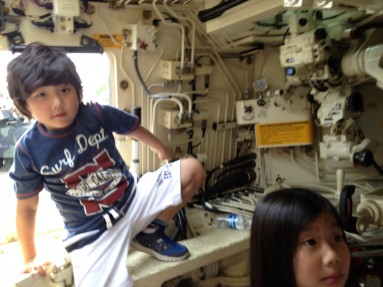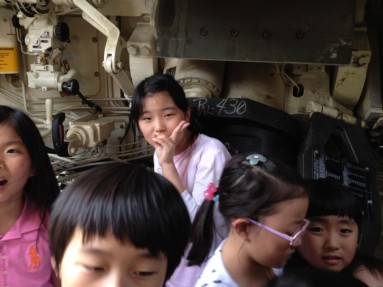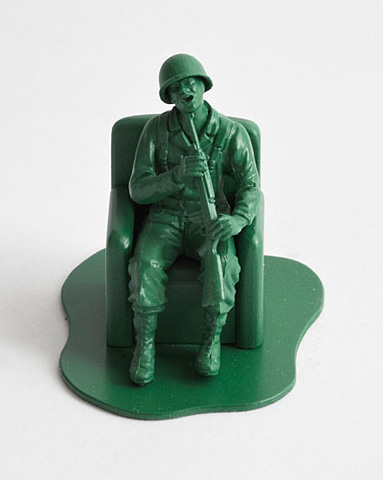We approach security, five of us. Better finish this beer first. I’m beginning to feel nervous. Chug. But what’s the worst that can happen? That we get turned away, I suppose, maybe laughed at. All that barbed wire, though. Not a little unwelcoming. And now, Christ: a fucking metal detector. I pat myself down. I’m sure I’ve got nothing on me, certain of it. Still, you never know. Camouflage everywhere. Very nervous now – but surely nothing on me, surely. Nothing beeps. I’m through. Have I seen this place before? “Identity cards please.” Friends produce theirs, show them off. They’re in. Shit. Nothing on me. Fuck. “Er, Ireland saram.” He nods. What? Why does he nod? Isn’t this Camp Walker, one of the largest United States Military bases in South Korea? Are you kidding? You can’t let me in – I could be anyone!
I’m in. But is that even such a good thing?
It is with some reluctance that we’ve decided to visit this very well-attended fair at Daegu’s Camp Walker. Among the natives and the English-teachers alike, the United States Military has a pretty poor reputation in South Korea, where signs outside many nightclubs state that, due to unspecified trouble in the past, US Military personnel will not be admitted. Identity cards are vital. Whether or not it’s fair to place a blanket ban on a particular group of people, I’m not sure. But the reality is that, while the US Military is supposedly stationed here to make Koreans feel safer by day, its members are viewed as a threat to safety at night. Reported incidences of rape, assault and theft have led to the recent reintroduction of a military curfew between 1 am and 5 am. Every weekend come 1 am, military policemen can be seen scouring the bars of Daegu in search of GIs, who are then dragged from the bars to the jeers of the clientele they’ve spent all night hassling.
Despite all this, we come to Camp Walker lured by the promise of free food and beer, neither of which ever materialize. Instead, you can buy popcorn from a stall and beer from a small tent where an old Korean woman is working alongside an American man dressed in a referee’s uniform. He is quick to make it known, through a series of unnecessarily brusque demands of his colleague, that he is the person in charge. The plastic cup my beer comes in says: “Great Heroes Deserve Great Taste.” The beer itself disagrees. There are no more heroes.
We walk past the go-karts, past the dunk tank, past the mechanical bull – which gyrates, unsaddled and forlorn – and move towards a helicopter taking off as part of a display of various war machines in action. A bunch of kids run excitedly to it, their sprint slowed only by the great gusts produced by the helicopter’s propellers. I admit that if I had a hat, I’d have to hold onto it, but the display is otherwise unimpressive. On we move to one of the huge tanks surrounded by display missiles and filled with children, who climb through its interior as if it were some kind of military jungle-gym. Try as I might, I can’t resist the urge to think of Barthes. “The fact that French toys literally prefigure the world of adult functions,” he writes, “obviously cannot but prepare the child to accept them all, by constituting for him, even before he can think about it, the alibi of a Nature which has at all times created soldiers, postmen and Vespas. Toys here reveal the list of all the things the adult does not find unusual: war, bureaucracy, ugliness, Martians, etc.” For Barthes, the child is treated as nothing “but a smaller man, a homunculus to whom must be supplied objects of his own size.” Here, though, we have tanks-as-toys supplied in normal, adult size, which obviously cannot but prepare the child to accept war not only as something normal, but as something bigger than him, something immovable you may play inside but never control.

Standing a few feet back away, feeling slightly overwhelmed by how grotesque the whole thing is, we are approached by an American woman who expresses displeasure at one of my friends for smoking. “Can’t you see there are kids around here?” she asks. All the kids are actually inside the tank, but he apologizes nevertheless and extinguishes the cigarette. She continues to berate us, though, forcing it upon us how dangerous our disgusting smoke is to a child, how it sets a bad example. The irony of being told to stop smoking for the sake of the children by a woman currently overseeing her child’s indoctrination into an ideology of mass industrial violence is not lost on me, but I decide not to press the issue because, frankly speaking, I’m terrified of almost everyone here.
The situation has passed by the time another friend, uninvolved in the previous dispute, comes over and asks me to hold his – yes – his cigarette while he becomes acquainted with the inner workings of the tank. Against my better judgement, I take it from him, but sidle as far away from the tank as is possible without seeming to be making off with the cigarette. Two clunking big Caterpillar boots come into view. I look up to find the irate face of a large man in camouflage just a few inches from mine. He tells me in a tone that hangs unstably between passive and active aggression that, since there are children around, he believes it would be best if I moved myself and my cigarette – he points an inexactly distant spot – all the way over there. “I’ll just put it out,” I gulp. “Yeah,” he smirks. “Yeah, that’s right.” He turns around and marches some two-hundred yards into the distance, returning, it seems, to something he’d been doing before he saw me, slowing down only to crane his neck back in my direction to make sure I haven’t sparked up again. His walk stirs something up from inside me – I could swear I’ve seen it before. Had the man in Caterpillars really come all that way just to talk to me? How had he seen the cigarette? Were we being watched from on high? A sniper spots the first cigarette being lit, I recall. He draws aim on the second. I won’t risk a third today. Time for another beer.
On our way to the bar, we walk past the stage to get a look at the band we’ve heard playing for the half an hour, but find to our surprise that, although all the instruments are all set up, there’s nobody on stage. Though obviously not as chilling as, say, the moment in Mulholland Drive where the singing continues despite the singer’s collapse, there is something about such loud disembodied music that I find just a little disquieting.
Back at the tent, the boss is going berserk. There’s a long queue of thirsty patrons and the beer seems to have run dry. We aren’t waiting long before some Stetson shows up in a golf buggy, a fresh keg riding shotgun. It is no exaggeration to say that this man looks exactly like Jim Ross, the World Wrestling Entertainment commentator about whom I remember little else besides his jocular misogyny. Right down to partial facial paralysis, this guy is Old JR himself.
Suddenly the beer boss and the barbed wire and the disembodied music and the craning two-hundred yard march make some kind of sense to me. I am not unearthing any deep seated trauma, as I’d suspected. No, I am simply remembering watching WWE on television as a child. Barbed wire speaks of your standard cage match, of course. The referee’s jersey recalls the inevitably bent or bumbling idiot charged with adjudicating the proceedings The loud disembodied music brings to mind the wrestler’s bombastic entrance, while that craning two-hundred yard march evokes the exit a wrestler makes in victory, neck turned at regular intervals to ensure that his opponent, who lies bloodied and spread-eagled on the canvas, has not sparked up a consolation cigarette in front of all the children. We later come across a badly-made picture-poster filled marked “The Appalling End of North Korean Defectors” and I’m reminded of nothing so much as the posters the crowd waves denouncing the villainous wrestler as he steps into the ring.

Leaving these images aside, though, the world of wrestling isn’t a bad comparison to draw with the fairs that apparently take place at Camp Walker on a regular basis. Both exist as pure spectacle – “spectacles of excess,” to quote Barthes on wrestling – in which the lines between good and bad are clear. The spectator “experience[s] a kind of intellectual pleasure in seeing the moral mechanism function so perfectly”. The two differ only in their relationship to irony and camp. Whereas the world of wrestling exhibits these qualities in abundance, there is no sign of camp at Camp Walker and not a hint of irony to the spectacle on show in this singularly un-ironic nation.
